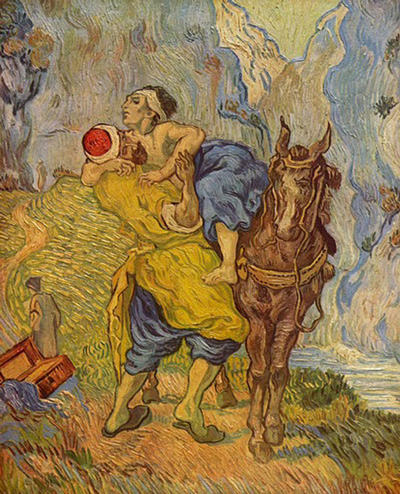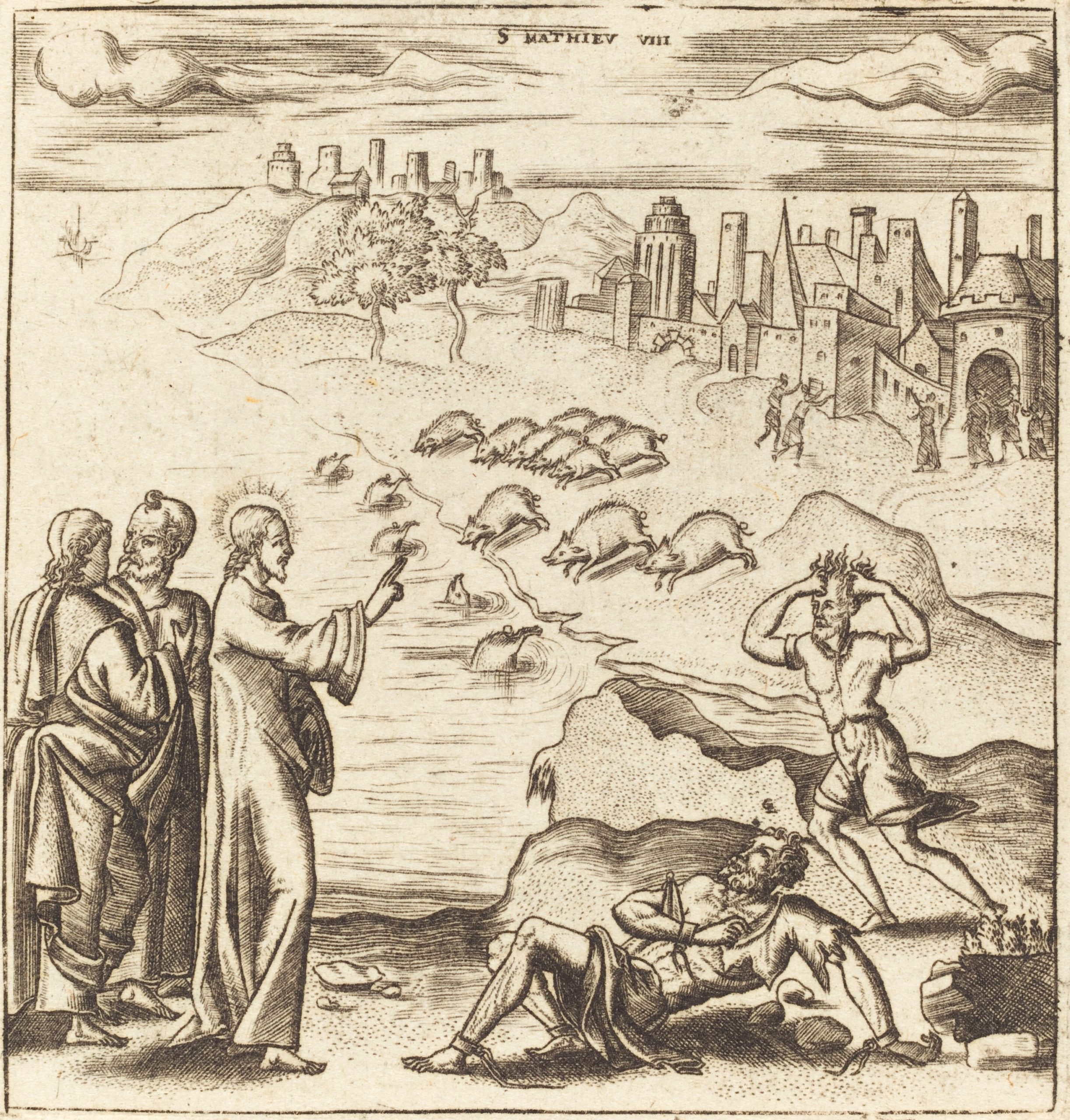
“Christ in the House of Mary and Martha” – Vermeer (1655)
The Gospel reading is here.
Let’s set the scene. We are in the long travel narrative in Luke (9:51 — 19:28). Jesus “set his face to go to Jerusalem” (9:51) and instructs those who would follow that the journey must be their first priority (9:57-58). Jesus sends the seventy ahead with no provisions for the journey and insists they depend on the hospitality of those in towns who welcome them (10:1-11).
Immediately preceding the stop at Martha’s home, Jesus tells a story about a man on a journey who is beaten and left to die. He is saved by an unexpected merciful neighbor (10:30-37). The story of “the good Samaritan” confirms that the journey to Jerusalem is dangerous, and that disciples might welcome the compassion of someone who, in other circumstances, would be considered undesirable.
This week we are in a seemingly peaceful setting – Jesus is invited into the home of Mary and Martha who live with their brother Lazarus in Bethany not far from Jerusalem. This is only reference to Mary and Martha in the synoptic gospels (Matthew, Mark, Luke). The two sisters and their brother, Lazarus, figure prominently in the fourth gospel, but hardly at all in the synoptics.
This is one of 3 mentions of this family:
1. Jesus was their guest – this week. Luke 10:38-42
2. John 11:1-44 When Lazarus had died, Jesus came to Bethany. Martha, upon being told that He was approaching, went out to meet Him, while Mary sat still in the house until He sent for her. It was to Martha that Jesus said: “I am the Resurrection and the Life.”
3. John 12:1-8 About a week before the crucifixion, as Jesus reclined at table, Mary poured a flask of expensive perfume over Jesus’ feet. Mary was criticized for wasting what might have been sold to raise money for the poor, and again Jesus spoke on her behalf.
On the basis of these incidents, many Christian writers have seen Mary as representing Contemplation (prayer and devotion), and Martha as representing Action (good works, helping others); or love of God and love of neighbor respectively.
Martha like the Samaritan is welcoming and is doing what women then were supposed to do – getting the house ready for the visitor. However, she is overwhelmed. We don’t how many guests there are. Where Jesus goes there are at least 12 other guys following him…and then the gravity and reality of the invitation comes crashing down on her. She is distracted. By contrast, Mary is sitting at the master’s feet, intent on listening to him but not lifting a finger to help.
Martha wants Jesus to tell Mary “get with it” and help out. Instead Jesus turns the tables and praises Mary saying “Mary has chosen the better part, which will not be taken away from her.”
So what’s going on here ? There are a variety of interpretations
1. The Kingdom is being brought to all and in particular women
Jesus is crossing Jewish cultural bounds – he is alone with women who are not his relatives; a woman serves him; and he teaches a woman in her own house.
Women were not supposed to sit with teachers as the disciples did. Mary is assuming a male role – at the feet of Jesus.
In the first century, rabbis did not teach women. Outside of being instructed in their proper gender roles according to custom and law, women received no education.
Both in the previous story, the Samaritan and this story, they are moving beyond boundaries. The Samaritan for Luke illustrates the second commandment (‘Love your neighbor as yourself.’). Mary exemplifies the fulfillment of the first commandment. ‘You are to love God with all your heart, with all your soul, with all your energy, and with all your mind.’
2. How do we deal with rivalries ?
The Martha and Mary story is just another in a series of instances of the disciples letting rivalry get in the way. This is similar to James and John and their discussion of “whom is the greatest?” in Mark, Chapter 9.
Martha asks Jesus to intervene. “Tell her then to help me.” Martha has considered by some to be a “control freak.”
Jesus doesn’t mince words in his response. Calling her by name not just once but twice, in a manner that sounds more like a parent than a friend, he describes the situation.
The rivalries that we live in are the things that distract us. Jesus calls us out of these rivalistic relationships and into the Kingdom. Without the rivalry we can still attended to the daily demands of life, but maybe without seeing ourselves as victims of someone.
3. A further study in hospitality
Hospitality, sharing a meal in particular, is a prominent theme throughout Luke and how one is received or not. In the narrative world of Luke, hospitality is multi-dimensional. According to this gospel account, we see hospitality from the perspective of receiving hospitality as well as extending it to another. Hospitality in Luke’s world is not limited to sex, religious preoccupation or county – it is open to all.
In this story, we expect Jesus to affirm the one who welcomes them into her home and prepares all that is needed to make them comfortable.
Yes, serving is encouraged too and follows naturally from following Jesus. This serving, however, is not drudgery, and is not to be accompanied by anxiety, distraction, worry, and trouble.
This story is a clarification of hospitality in the Samaritan story. Both Mary and Martha are doing. Doing is not the only thing. Eternal life is not gained in just the doing, but in the receiving – in hearing and believing.
4. Another alternative?
Mary & Martha’s story is a story about priorities and choices.
It’s about choosing to make God a priority in our lives and not merely the façade of God in our lives a priority.
Often we get consumed with making sure everything is in its place and there is a place for everything.
What is the most important thing we should be doing in the context of our daily activities ?
It’s about choosing to allow God to shape us into the people God needs us to be and then allowing God to use us to impact those around us in healthy, up-lifting, God-inspired ways.
What God wants for us is to become comfortable at his feet and “engage in the task” of sitting and listening as he reminds us of how really good life can be – even when life is not going as we have planned. And as we sit and remember what God promises, then we can go out and do as God wants.
In Eugene Peterson’s, The Message, Jesus’ words to Martha are, “Martha, dear Martha, you’re fussing far too much and getting yourself worked up over nothing. One thing only is essential, and Mary has chosen it – it’s the main course, and won’t be taken from her.”
“Mary has chosen the better part, which will not be taken away from her.”
What really matters is how these two responded to God’s presence in their midst.
Thinking about God’s word as the “main course” in the feast of Life, however, doesn’t give that immediate sense that listening is better than doing. Instead, it places these two activities in balance. The word calls for us to both sit and listen AND to go and do.
Since this story is about “turning the tables” one further extension of that is to consider Jesus the host and not Martha. Jesus is the host, not Martha or Mary or anyone of us, and he spreads the word like a banquet to nourish and strengthen us. The word has within it commands both to sit and listen, and to go and do. We “sit on our salvation,” but then scatter into the world and work of daily life.
We must balance the role of food-preparer with that of friend and listener. Her actions are actually causing separation from Jesus at the same time she is drawing her into the home.
As with previous weeks, there is an urgency involved.
The key is that there is an urgency to the kingdom. In Chapter 10 we saw several weeks ago, there is no time to rest; no time to bury the dead, even a parent; no time to say goodbye to family; no looking back (10:57-62). it. We might consider Martha’s concern for hospitality as similar to the “distractions” Jesus names at the outset of the journey to Jerusalem. Seeking God’s Kingdom is the first priority above all else, even the common customs of hospitality.
If you look carefully, Jesus doesn’t say anything about not cleaning house or preparing dinner. He is not saying people should not have “many things” to do. Martha’s issue is not that she is a busy person. She is distracted by her many tasks and missing the fundamentals of having a chance to hear the gospel.
Like the lawyer last week in the Good Samaritan, Martha is focused on “me.” “Why do I have to get the house ready, while Mary gets the best role.” We see this is in many churches. “Why does so and so get to do this while I alway have to wash dishes.”
The author of the blog “Theological Stew gets the heart of the matter: “But here’s what I see in this. Martha was so busy with her eyes on what Mary was doing that she wasn’t being faithful to her own calling. The interesting thing is that Martha could have been just as close to Jesus doing what she was doing as Mary was sitting at his feet. She just didn’t see it.”



